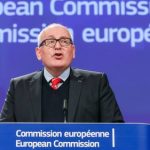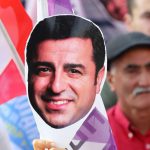Ew Dibêjin ‘Hûn Tunene’; Em Dibêjin ‘Em Hene’
They say ‘you do not exist,’ we say ‘we exist.’
On my way to vote in local elections Diyarbakır, the biggest city in Turkey’s mainly Kurdish southeast, I kept thinking of this sentence. I think many Kurds share these sentiments. In spite of everything we have endured – the destruction of our cities, the imprisonment of thousands of people, the replacement of elected officials by centrally appointed administrators and the threats to do the same again after the polls – we voted yesterday to declare that regardless of the outcome, we are here.
As results came in, our house became increasingly animated. The sound of celebrations poured in from outside, and we spent the night waiting with baited breath for the final results of the race for mayor Istanbul.
Regardless what anyone says, the election strategy of the Peoples’ Democratic Party (HDP) seems to have worked. In addition to defeating all the administrators appointed by President Erdoğan’s Justice and Development Party (AKP) to govern the Kurdish provinces in the east, the pro-Kurdish HDP also played a role in the AKP’s losses in the west of the country. Selahattin Demirtaş, the jailed former co-chair of the HDP, had a significant impact with his call to the electorate to turn out and vote. “If you have any consideration for my wishes, my request is this, harden your heart if necessary, but please make sure you go out to cast your vote.” The results show once more the high regard in which people hold Demirtaş.
The HDP entered this election under the pressure of daily arrests, constant demonisation, and targeting by the government. Just one day before the election, a number of HDP leaders were arrested. For a party that entered the elections under these conditions, the results are quite an achievement.
One of the subjects of discussion in election night was how the AKP won 61 percent of the vote, almost double that of the HDP’s 34 percent, in the southeastern city of Şırnak. I would like to share my observations of Şırnak, a city I visit frequently. I must admit that, though I did not expect such a wide margin, I expected the AKP to win control of the municipality there.

After the government introduced a 24-hour curfew in Şırnak in 2016, 70 percent of the city was destroyed. The Şırnak we knew has disappeared. It has been replaced by a new city, comprised of six-to-12-storey buildings owned by the Housing Development Administration. Keys to some of these apartments have been distributed, but some are still vacant. Nearly 40 percent of the city’s population has yet to be able to return to the city. When I wanted to talk to Şırnak residents two months ago, I had to travel to nearby villages to find them. There are thousands of people from Şırnak in these villages, living in temporary houses.
Şırnak neighbours both Iraq and Syria. The government paid special attention to Şırnak. It was turned into a city dominated by the pro-state Kurdish village guard militia, soldiers, and police. When you enter the city, you can see tanks and armoured vehicles everywhere. On my last visit, I noticed that in addition to the big families that traditionally filled the ranks of village guards, many young people were becoming guards and watchmen. A police station was built in every neighbourhood. Şırnak was transformed.
As I write these observations, I know some people will inevitably ask “who brought Şırnak to this point?”, “how did urban warfare erupt?”, “doesn’t the Kurdish movement bear responsibility for this population change?” This is an important discussion that needs to take place, and certainly a topic the Kurdish movement must evaluate. But it is the subject of another article.
As the election results become clear, I met community leaders in Diyarbakır and I asked them what they expect to happen next.
An important community representative responded: “Kurds have been the determinants of this election. For this reason, I think Erdoğan and the AKP will re-evaluate their policies. The deep state is dragging Erdoğan down a bad path. Erdoğan must be vigilant. The president should think carefully, come to the Kurds and ask, ‘where did we leave off [in peace negotiations]?’ This would be the best course of action for him.”
Another Diyarbakır native says: “There are lessons the HDP must take away of course. Şırnak, [its neighbour] Hakkari … these should be lessons. I hope the destruction of these cities will lead to some self-reflection.”
“The numbers show that Kurds have withdrawn their support from the AKP,” someone else observed.
On my way to work the day after the elections, I saw the metal barricades that stood in front of the municipal government building had been removed. My momentary elation was caught in my throat. The barricades had not been removed, but merely moved. When I asked a worker at a nearby bakery the reason, he said: “they say it’s because they are going to appoint another administrator.”
This is not possible! The Kurdish people have clearly demonstrated in this election that this is not an option. The barricades in front of all of these buildings will be removed, soon. Diyarbakır residents will once more comfortably enter and leave their municipal buildings. The survival of this country will not come from criminalising Kurds, it requires establishing an inclusive society for all people; Kurds, Turks, Armenians and Arabs, and fighting for democracy together. The victor in this election is Turkey, and Turkish democracy. Those who secured the victory are the Kurds. As for Demirtaş, I send him my heartfelt greetings. We will tear down his metal bars as well, soon.



